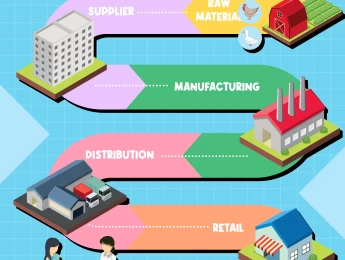Establishing effective waste management within any organisation that deals with waste is important. Waste can have substantial negative impacts on health and the environment. Recently, there has been a global shift away from traditional waste disposal methods and towards more environmentally safe alternatives.
Waste management is vital in protecting the environment and reducing lasting damage. Those dealing with waste must be competent and understand laws and regulations surrounding waste management to ensure full compliance with environmental protection laws. Furthermore, regular environment audits should be conducted to gather data on the surrounding environment and how practices could be developed.
There must also be an understanding of the different types of waste and how they must be disposed of differently. Some waste disposal methods are significantly more harmful than others but are difficult to change, so extra steps must be taken to help repair the environment and prevent further extreme damage.
Upon completion of this course, participants will be able to:
- Understand the importance of effective environmental waste management within an organisation.
- Acknowledge the environmental implications and consequences of poor waste management.
- Assess existing waste practices and how these can be developed to be more environmentally friendly.
- Review laws and regulations surrounding waste management and disposal and closely follow guidelines.
- Explore new technologies and developments within waste management and how these can be applied to reduce environmental damage.
- Consider existing contaminated land and its influence on waste management activity.
- Engage in open conversations with other organisations and collaborate in developing environmentally conscious waste practices.
This course is designed for anyone within an organisation responsible for waste management who wishes to develop their knowledge and skills. It would be most beneficial for:
- Environmental Managers
- Suitability Advisors
- Waste Managers
- Operations Managers
- Nature Recovery Strategy Officers
- Environmental Surveyors
- Environmental Planning Directors
This course uses a variety of adult learning styles to aid full understanding and comprehension. Participants will review case studies of established organisations to highlight key methods of effective waste management and identify areas where environmental damage may be prevalent.
To ensure the participants develop a full understanding of the taught content, they will participate in a variety of learning methods, including seminars, demonstrations, group discussions, and practical activities. This combination of activities guarantees that the participants can gain full comprehension of the taught knowledge and related practical skills.
Day 5 of each course is reserved for a Q&A session, which may occur off-site. For 10-day courses, this also applies to day 10
Section 1: Fundamentals of Environmental Waste Management
- Defining environmental waste management, its necessity, and its importance within an organisation.
- Recognising global environmental issues and how ineffective waste practices have contributed to these.
- Accepting the concept of a ‘duty of care’ when preserving the environment.
- Industry concepts, principles, and standards of waste management and how these have evolved over time.
Section 2: Environmental Auditing
- Reviewing laws and regulations surrounding waste management, including the ISO 14001 specification for an environmental management system.
- Assessing and auditing environmental management systems and their effectiveness surrounding waste disposal.
- The responsibilities of managing waste – storage, packaging, transport, and disposal.
- The process of transporting waste by road, including special waste regulations.
- Investigating contaminated land and implementing steps to reduce further damage.
Section 3: Waste Collection
- Adhering to regulations surrounding waste collection.
- Paying the landfill tax – the environmental cost of waste.
- Understanding the process of waste segregation and collection – ensuring no item is incorrectly disposed of.
- Delegating waste to landfills and recycling facilities through waste transfer stations.
- Establishing internal collection protocols for clinical and special wastes.
Section 4: Operational Controls
- Managing containment systems for landfill sites – preventing sites from becoming over-encumbered and permanently damaging the land.
- Providing site aftercare to reduce pollution and permanent damage where possible.
- Understanding the differences and requirements of food and clinical waste disposals.
- Managing gas, electricity and incinerator emissions and residues.
Section 5: Environmental Management
- Working collaboratively with other organisations and local authorities to develop policies to protect the environment further.
- Take the necessary steps to reduce harmful practices and encourage other organisations to do the same.
- Identifying non-compliance and implementing corrective actions.
- Establishing regular environmental audits to ensure positive changes are occurring.
Upon successful completion of this training course, delegates will be awarded a Holistique Training Certificate of Completion. For those who attend and complete the online training course, a Holistique Training e-Certificate will be provided.
Holistique Training Certificates are accredited by the British Assessment Council (BAC) and The CPD Certification Service (CPD), and are certified under ISO 9001, ISO 21001, and ISO 29993 standards.
CPD credits for this course are granted by our Certificates and will be reflected on the Holistique Training Certificate of Completion. In accordance with the standards of The CPD Certification Service, one CPD credit is awarded per hour of course attendance. A maximum of 50 CPD credits can be claimed for any single course we currently offer.
- Course Code PO2-116
- Course Format Classroom, Online,
- Duration 5 days














